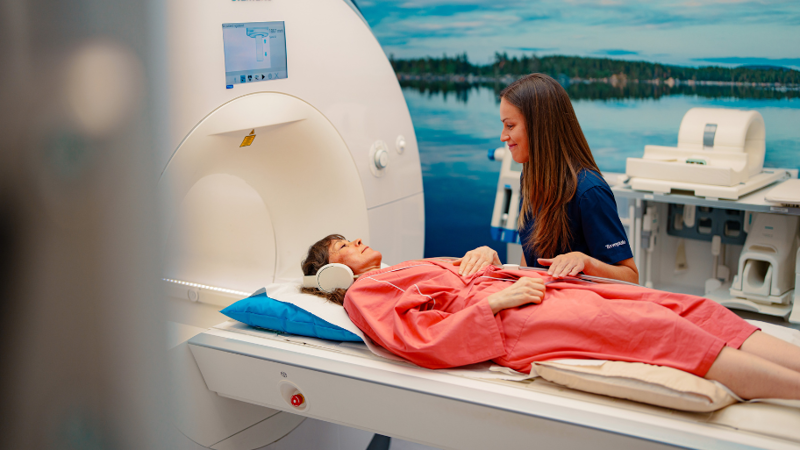Mental health-related sickness absences decreased significantly thanks to brief psychotherapy provided by occupational health services
The number of mental health-related sickness absences of Terveystalo’s occupational health customers decreased by approximately 40% as employees were offered brief psychotherapy as part of their occupational health care. This can be seen in the Terveystalo survey which monitored occupational health care customers' brief psychotherapy appointments and prescribed sickness absences between 2000 and 2022.

According to a survey by Terveystalo*, mental health-related sickness absences were reduced by 40% when employees were offered access to brief psychotherapy as part of their occupational health services. Other sickness absences also decreased: other diagnoses showed a relative decrease of 15% and all diagnoses a relative decrease of 34% in sickness absences.
– All this indicates that brief psychotherapy as part of occupational health services is an effective and economically viable form of treatment for mental health challenges. Even a short period of psychotherapy is helpful, as the share of sickness absences in working hours starts to immediately decrease at the beginning of the treatment period. On average, sickness absences decreased by 7.2 days per employee, thanks to therapy, says Jukka Pitkänen, Chief Physician at Terveystalo Occupational Healthcare.
A significant share of sickness absences is due to mental health problems – they are also the main cause of disability retirement in Finland
Globally, mental disorders have been on the increase for a long time, and in Finland, they are currently the main cause of disability retirement. In addition, a significant share of sickness absences is due to mental disorders.
– Research shows that it is important to treat mental health challenges at an early stage, not only after symptoms have been prolonged or become chronic. Timely access to treatment has been proven to reduce not only mental health-related sickness absences but also human suffering. Treatment has a positive impact on the well-being of the entire work community as well as on the individual and their family. A parent's mental health always affects children and young people, says Tuija Turunen, Terveystalo's Chief Psychologist and Psychotherapist.
Brief psychotherapy provided by occupational health services helps ease the nationally congested mental health services and enables treatment in accordance with the Current Care Guidelines within the person’s occupational health services
In Finland, psychotherapy is typically implemented as long rehabilitative psychotherapy processes that take about 1–3 years and are state-supported through Kela.
– However, some of the challenges in recent years have included the increase of mental health problems, the scarcity of primary health care resources and the increase in somewhat direct referrals to rehabilitative psychotherapy. With brief psychotherapy provided by occupational health services, we have helped ease the nationally congested mental health services and ensured that Kela's long rehabilitative psychotherapy is provided to people who need long rehabilitation. At the moment, any means to address mental health challenges effectively and quickly are vitally important, says Tuija Turunen.
The brief psychotherapy model for occupational health, created by Terveystalo in 2017, enables occupational health customers to receive high-quality treatment in accordance with the Current Care Guidelines within the same organization without the immediate need to seek mental health services elsewhere.
– The brief psychotherapy model has also acted as a trailblazer in bringing together effective treatment, multi-professional occupational health care activities and support for coping at work or returning to work, says Jukka Pitkänen.
Brief psychotherapy provided by occupational health services: what does it mean?
- As part of mental health care, Terveystalo launched a model in 2017 where companies who have an occupational healthcare agreement with Terveystalo can offer their employees access to brief psychotherapy.
- At Terveystalo, brief psychotherapy can be included in the occupational healthcare agreement, for example, or the employer's insurance may cover a treatment period.
- After identifying the need for treatment, the occupational health physician responsible for the treatment makes a referral for brief psychotherapy, which starts within three weeks of the referral on average. In some cases, an occupational health psychologist can also make a referral in cooperation with the physician in charge of the treatment.
- The recommended duration of brief psychotherapy is 10–20 appointments. The average duration has been 12 appointments. Brief psychotherapy provided by occupational health services is a goal-oriented and active treatment period which is always carried out by a psychotherapist either in person or as a remote appointment.
- The effectiveness of the treatment is monitored at the beginning and end of the treatment period using the CORE-OM and BDI questionnaires commonly used in psychotherapy.
- The occupational health physician remains responsible for the treatment and receives a report from the psychotherapist concerning the treatment.
- Psychotherapy is a psychological treatment method aimed at the improvement of mental health, working ability and functionality. The main method is discussion with a psychotherapist.
*The data of the survey consists of the brief psychotherapy appointments of Terveystalo’s occupational health care customers in 2000–2022. The survey includes customers who have had an occupational health connection to Terveystalo during the entire pre-therapy review period (3 months), during the therapy and the follow-up period after the therapy (3 months). The survey included 9,109 occupational health customers and a total of 72,296 brief psychotherapy appointments. The survey was carried out in accordance with the Act on Secondary Use of Health and Social Data (Section 41) and the data was processed securely without any personal identifiers.
The results show a relative decrease of 40% in mental health diagnoses, a decrease of 15% in other diagnoses and a relative decrease of 34% in all diagnoses in terms of sickness absences. The effectiveness of treatment is also monitored at the beginning and at the end of the treatment period using the CORE-OM and BDI questionnaires. According to the BDI depression questionnaire, during the treatment, the mood-related symptoms of employees receiving brief psychotherapy improved on average from mild depressive symptoms to normal reference levels. Based on the CORE-OM questionnaire which measures wider psychological well-being and effectiveness of treatment, psychological symptoms decreased and functional capacity and perceived well-being increased significantly.
Latest articles

Terveystalo's digital services have been awarded the internationally recognized ISO27001 information security certification.
Terveystalo's information security practices, processes, and risk management are in line with international best practices.

Does massage help relieve stress? – Touch restores and calms the body and mind
Stress is not always visible on the outside, but the body does show signs when the strain increases. According to Lassi Ylönen, a trained massage therapist at Terveystalo Rela, the body often communicates stress through subtle signs.

Circular economy and artificial intelligence boost performance and improve care
At the heart of sustainable healthcare, technology serves as a tool for improving both the quality of care and accountability. Terveystalo favors solutions that combine sustainability, cost-effectiveness, and medical expertise.

Psychologist: How to make Christmas a relaxed and personal celebration
For many, the anticipation of Christmas begins when cities are decked out in seasonal lights and the first chocolates, calendars, and gingerbread cookies appear on store shelves. Christmas carols ring out and the Tonttuparaati choir sings “Kiire jo on! Kiire jo on!” (Hurry up! Hurry up!). This warm and atmospheric celebration also brings other feelings to mind: how on earth can we get through all this without losing our joy and peace in the rush?

Terveystalo and Gosta Labs deepen their cooperation: the goal is to streamline work with a superior patient information system
Terveystalo is deepening its cooperation with Finnish health technology company Gosta Labs and investing €1 million in the company as a minority investor. The aim is to jointly develop artificial intelligence solutions that improve the quality of care and the efficiency of reception work as part of Terveystalo's new patient information system, Terveystalo Ella.

First aid preparedness in companies requires action and courage
First aid skills increase resilience, but a barometer survey of Finnish organizations' first aid capabilities published in October reveals that the number of trained personnel is alarmingly low.